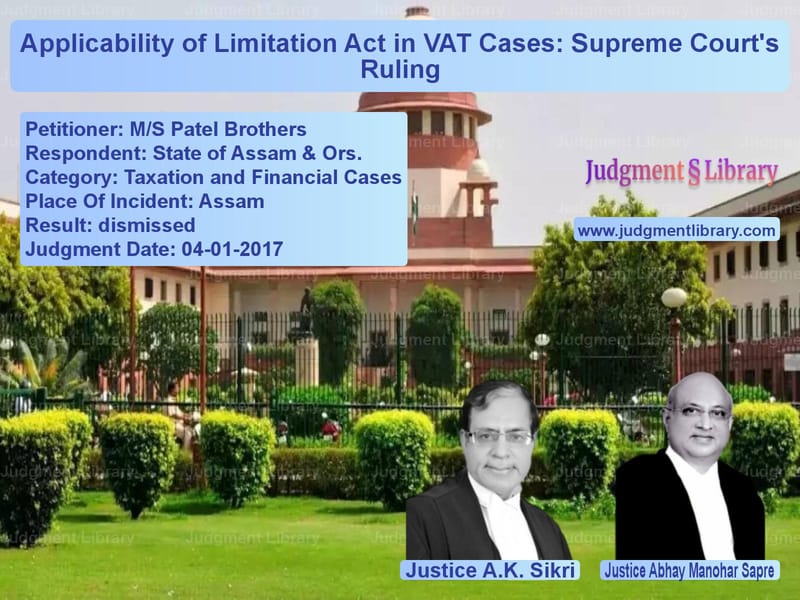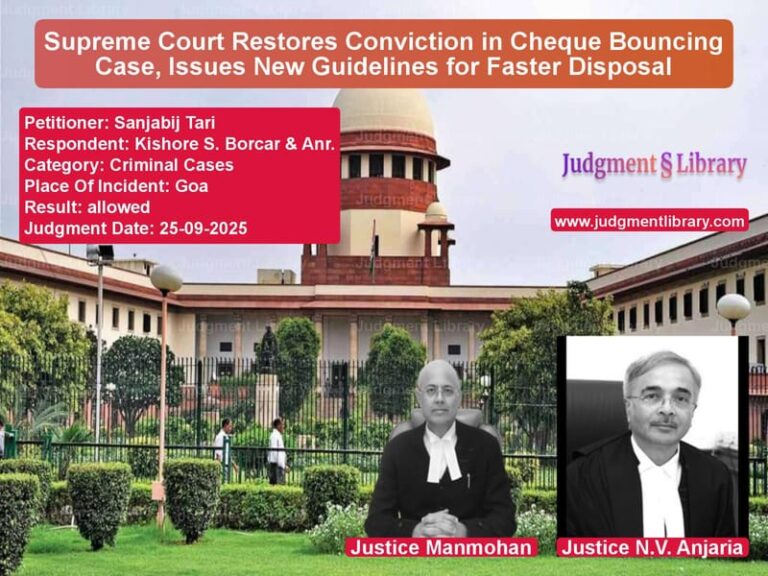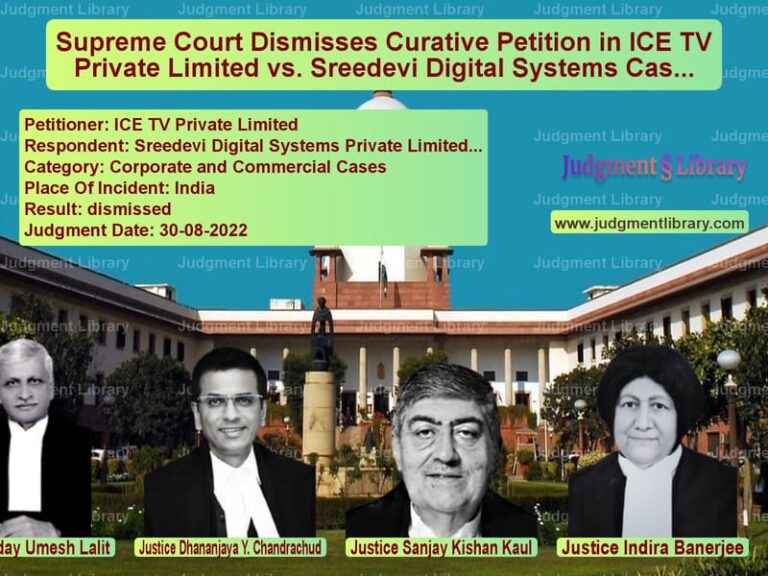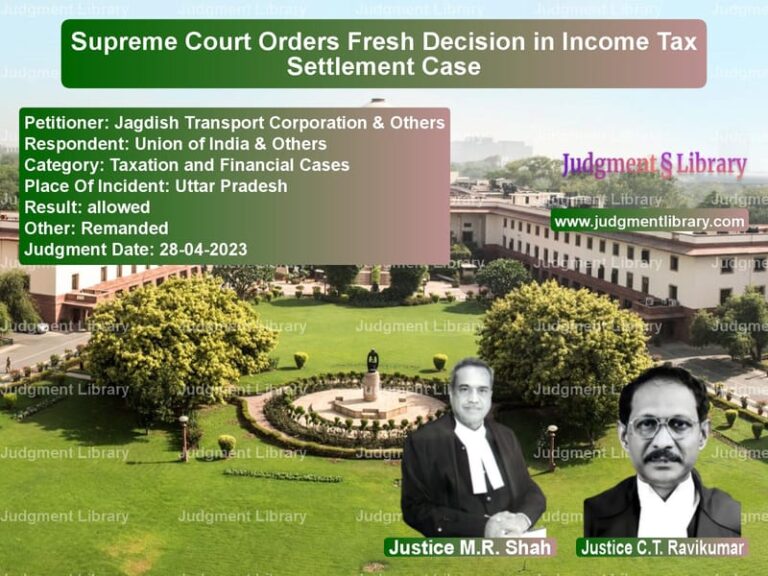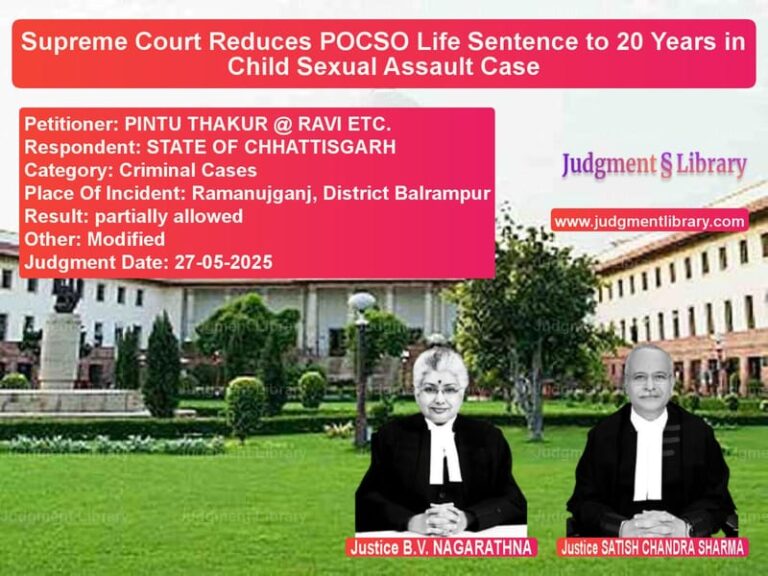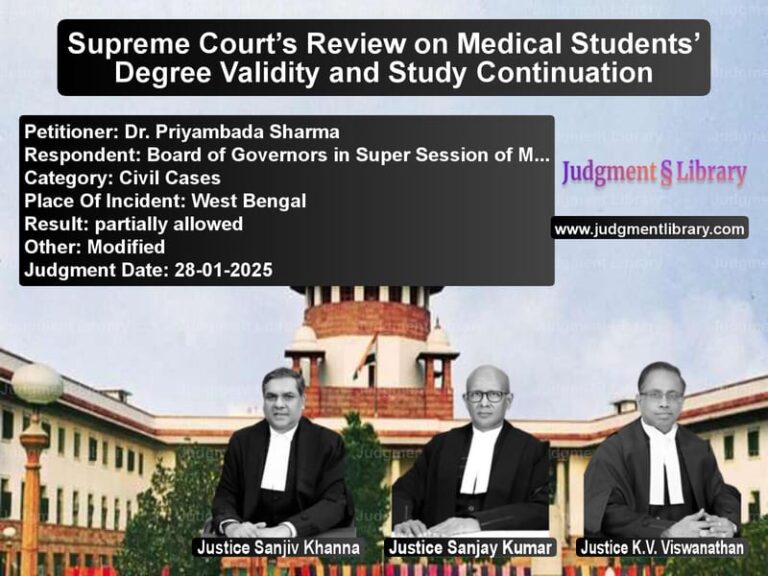Applicability of Limitation Act in VAT Cases: Supreme Court’s Ruling
The Supreme Court of India in the case of M/S Patel Brothers v. State of Assam & Ors. addressed the critical question of whether Section 5 of the Limitation Act, 1963, applies to revision petitions filed in the High Court under Section 81 of the Assam Value Added Tax Act, 2003 (VAT Act). The Court examined whether the exclusion of Section 5 from the VAT Act was intentional and whether the High Court was correct in denying condonation of delay.
Background of the Case
The appellant, M/S Patel Brothers, was engaged in the business of purchasing tea and was a registered dealer under the Assam General Sales Tax Act, 1993, as well as the VAT Act and the Central Sales Tax Act, 1956. The appellant had submitted Form ‘C’ declarations for multiple years, claiming tax exemptions under Section 8(5) of the Central Sales Tax Act, 1956. However, upon scrutiny, it was found that the information provided was false, leading to re-assessment orders imposing penalties.
The appellant challenged these orders before the Appellate Authority, which directed the appellant to deposit 25% of the dues and stayed the rest of the demand. The appellant’s subsequent appeal before the Assam Board of Revenue was dismissed, as was the review petition. The appellant then filed revision petitions before the High Court under Section 81(1) of the VAT Act but with a delay of 335 days. The High Court dismissed the condonation applications, holding that Section 5 of the Limitation Act does not apply to VAT Act revision petitions.
Arguments by the Petitioner
- The appellant argued that the High Court failed to consider the broader provisions of the VAT Act and Section 29(2) of the Limitation Act, 1963.
- It was contended that Section 79 and Section 80 of the VAT Act allow condonation of delay in appeals, and the absence of a similar provision in Section 81 does not necessarily imply exclusion of Section 5.
- The petitioner relied on Mangu Ram v. Municipal Corporation of Delhi and State of Madhya Pradesh v. Anshuman Shukla to argue that Section 5 should be applicable unless expressly excluded.
Arguments by the Respondents
- The State of Assam contended that Section 84 of the VAT Act explicitly applies only Sections 4 and 12 of the Limitation Act, thereby excluding Section 5.
- They cited Hukumdev Narain Yadav v. Lalit Narain Mishra, which held that courts must look at the scheme of the special law to determine if Limitation Act provisions apply.
- The respondents argued that the VAT Act is a self-contained code, and the absence of a provision for condonation under Section 81 indicates legislative intent to exclude it.
Key Observations by the Supreme Court
- The Court examined the structure of the VAT Act and noted that Sections 79 and 80 explicitly allow condonation of delay for appeals, but no such provision exists in Section 81.
- Referring to Commissioner of Customs and Central Excise v. Hongo India Private Limited, the Court observed that in the absence of a condonation clause, courts do not have the power to extend limitation.
- The Court held that the inclusion of Sections 4 and 12 in Section 84 of the VAT Act, while omitting Section 5, indicated a clear legislative intent to exclude the latter.
Final Judgment
The Supreme Court upheld the High Court’s decision, ruling that:
- Section 5 of the Limitation Act does not apply to revision petitions under Section 81 of the VAT Act.
- The exclusion of Section 5 was intentional, as evident from the specific reference to Sections 4 and 12 in Section 84.
- The VAT Act is a complete code that prescribes time limits and does not permit High Courts to condone delays in revisions.
- It is for the legislature to amend the law if it intends to allow condonation of delay in such cases.
Significance of the Judgment
This ruling has far-reaching implications for tax litigation in India. It establishes that if a special law prescribes specific limitations without provisions for condonation, courts cannot extend the time limits. The judgment underscores the importance of strict adherence to statutory timelines in tax matters.
Conclusion
The Supreme Court’s decision affirms that the VAT Act’s limitation provisions are binding and that Section 5 of the Limitation Act does not apply. This judgment serves as a crucial precedent for similar cases where the applicability of the Limitation Act is in question. It reinforces that taxpayers must adhere to statutory deadlines or risk losing their right to appeal.
Don’t miss out on the full details! Download the complete judgment in PDF format below and gain valuable insights instantly!
Download Judgment: MS Patel Brothers vs State of Assam & Ors Supreme Court of India Judgment Dated 04-01-2017.pdf
Direct Downlaod Judgment: Direct downlaod this Judgment
See all petitions in Tax Refund Disputes
See all petitions in Judgment by A.K. Sikri
See all petitions in Judgment by Abhay Manohar Sapre
See all petitions in dismissed
See all petitions in supreme court of India judgments January 2017
See all petitions in 2017 judgments
See all posts in Taxation and Financial Cases Category
See all allowed petitions in Taxation and Financial Cases Category
See all Dismissed petitions in Taxation and Financial Cases Category
See all partially allowed petitions in Taxation and Financial Cases Category

